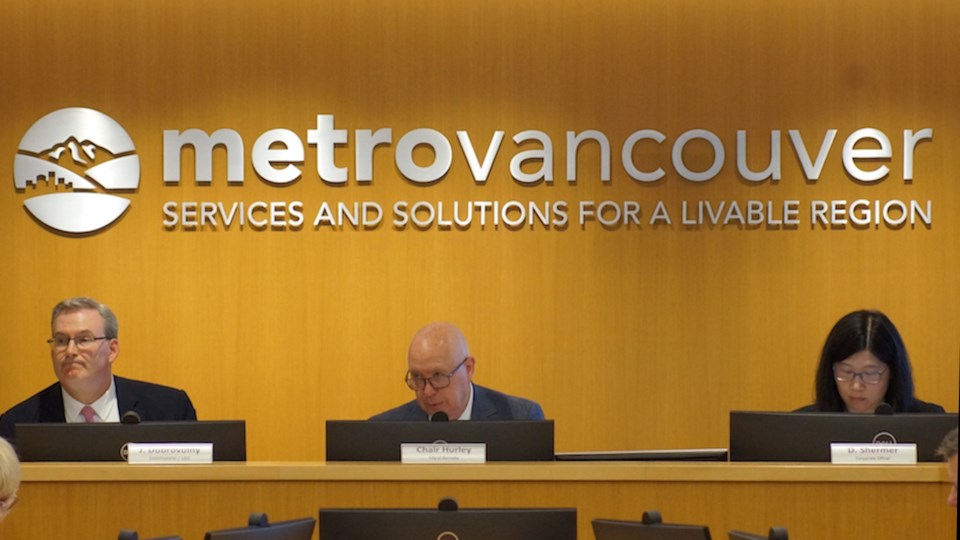Metro Vancouver has sought to renew its “media monitoring” services and has hired a “senior engagement specialist” to better communicate to the public what it is doing with respect to the North Shore wastewater treatment plant.
This comes amid the plant's budget woes, which is $3 billion over its 2017 estimate of $780 million, and several instances of board members expressing their concerns about media reports on the regional government’s problems with governance and expenditures.
A chief critic of Metro Vancouver since the plant’s new and extraordinary budget projection was released in March has been New Westminster city councillor Daniel Fontaine, who says concerns over the government’s image are misplaced.
“I think Metro Vancouver should be more concerned about double-digit tax increases; they should be more concerned about 12 people flying off to New Orleans with very little justification or business case to do so; they should be concerned about the massive cost overrun at the North Shore wastewater treatment plant; they have a million things to worry about aside from the narrative,” said Fontaine.
“When things get really bad and this out of control, the first thing an organization will blame is the people reporting on the story itself; I think that’s a sign, as I said before, that Metro Vancouver has some significant governance problems, in my opinion. Those need to be dealt with other than focusing in on whether someone is covering a story taking place in Metro Vancouver, in my opinion,” added Fontaine.
After Metro Vancouver inevitably released its new costs for the plant, to start budgeting, the government came under media scrutiny for travel expenses by board and staff members.
In May, Delta council voted to remove Mayor George Harvie as the city's representative on the Metro Vancouver board, ending his tenure as Metro's chair. Burnaby Mayor Mike Hurley replaced him on June 28.
Since then Hurley has moved relatively swiftly to appoint external lawyer John Hunter to advise the board on launching an independent performance audit; launch a governance review in 2025; and ban travel by board members and, now, staff.
The staff travel ban came after Hurley was “surprised” to learn of a 12-member trip to a New Orleans water services conference.
But at his first board meeting as chair on July 26, Hurley witnessed several board members question media articles questioning board spending or express concern about the public’s image of the regional government.
“It’s unfortunate this story is not balanced,” said District of North Vancouver Coun. Lisa Muri.
Burnaby Coun. Sav Dhaliwal cautioned of a “knee-jerk reaction.”
Township of Langley Mayor Eric Woodward questioned the notion of an audit while dismissing media reports on expenditures.
“I think it’s a waste of money," he said of the audit.
“If cheese and flights are a waste of money and hotel rooms are going to be the subject of endless articles, then how does spending …upwards of a million dollars [on an audit] …how is that not a colossal waste of taxpayers’ money?”
Richmond Mayor Malcolm Brodie shared similar views, saying he supports the audit “as we take a look with 20/20 hindsight.”
Coquitlam Coun. Craig Hodge said “the public is calling into question this organization and we need to move quickly to restore confidence” while Richmond Coun. Bill McNulty said, “We have a lot of work to do to tell our story. I don’t think the story of Metro Vancouver has been told enough.”
Hodge said any delay in the audit “concerns me because this narrative is just continuing on in the media.”
A month later the government had set up a $550,000 communications booth at the PNE, Metro Vancouver CEO Jerry Dobrovolny told the board Nov. 30 while noting that 90,000 people engaged with the booth.
Following that board meeting, Metro Vancouver’s director of communications Amanda McCuaig was asked if the board in any way directed staff to improve communications or if the organization took member comments under consideration.
She said the board works "very hard" to get its message out "objectively and factually accurate" by working with reporters.
McCuaig noted that “like any organization, we do media monitoring” and “use tools to help make sure we are seeing the landscape of all the stories being issued about the organization.”
In a statement to Glacier Media, Metro Vancouver spokesperson Jillian Glover echoed McCuaig and said the regional government has used media monitoring services for over 20 years and its contracts with its current providers are expiring this year.
"We are seeking to renew the services for another three to five years, as we have done in the past," the statement read.
As for the engagement specialist position for the North Shore plant, the role has existed since the project definition phase, going back to 2010.
"The latest person in this role left the position in August 2024 and we recently hired someone to replace them," said Glover.
She added there are currently no plans to ramp up Metro Vancouver’s participation in the PNE.
"The board is in the process of discussing whether or not to continue our PNE exhibition in 2025," said Glover.
Fontaine says this spending is questionable considering Metro Vancouver holds a monopoly on services and has been around for over 50 years.
“It’s not like Metro Vancouver has not had a long runway to explain to the public they are focused on sewers and water.”
“These types of engagement opportunities almost seem egregious and out of proportion given the financial realities that Metro Vancouver is facing and the tax bills they’re sending everyone, especially on the North Shore.”
Fontaine has called for a public inquiry into the plant and says that can act as a leapboard for an even larger inquiry into escalating public infrastructure costs.
Fontaine says all parties ought to be questioned under oath.
Editor's note: This story was updated Dec. 12 to include a response from Metro Vancouver.

